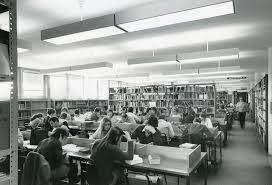The ’70s library is not past its due date
Recently, I visited Coventry Library for the first time. It is worth a trip if you haven’t been before – there are so many cosy reading spaces, a lovely study area, and a wide-ranging selection of books to read for pleasure (which is well-needed escape in the chaos of university life). My visit prompted me to reflect on what libraries were like in the 1970s after hearing the theme for this paper, so I decided to talk to my family about their experiences at their local libraries in the 70s.
I hope that libraries continue to thrive and provide a place for everyone
The 1970s were a time when there were only three TV channels, no Internet, an apocalypse of bell bottoms, and the position of the library was quite different to what it is today. My family recalled how the library had a lesser focus on community activities and reading groups and was instead a silent space for reading and browsing the book selection. I was particularly surprised when my dad referred to the ‘Reference Section’ as the “Google of its day,” as I don’t think I’d ever considered how people would look up information without the Internet. These encyclopaedias and reference books were not available to take out of the library, so people would take their notebooks and jot down key information. My mum also remembered rushing to the library to borrow other non-fiction books for her homework, before other members of her class got there first. I definitely take my phone camera and e-books for granted when I need to keep hold of information today, but I reckon a part of me would enjoy the library scavenger hunt.
Technology has definitely changed how libraries are run as well. My mum remembered the library’s filing system of little blue envelopes, each labelled with the names of each library member. These envelopes would keep hold of a small ticket corresponding to a specific book, and this was kept behind the library desk to know who had borrowed which book. While I do appreciate the ease of the self-serve machines in libraries today, part of me would love to have my book stamped with a return date, with its respective ticket placed in my own personal borrowing file.
As a self-proclaimed Waterstones addict, I was also shocked to learn that owning books was more difficult in the 1970s. Compared to income, my family recalled that books were more expensive than they are today, and in their experience, they would borrow books from the library instead of owning them. My dad told me that he remembered being given a few Famous Five and Rupert Bear books as Christmas presents. This culture around treating books as gifts made the library a way for everyone to access fiction, and to read a broader range of stories. Reading was one of the key sources of entertainment in the 70s, and my family remembered reading newspapers and fiction books during work breaks and on trains, unlike how most of us today would just scroll mindlessly on our phones. My grandad especially would not be seen without a new library book in his bag, just in case he had a spare few minutes to fill.
Though my family told me about the many differences that they noted between libraries in the 1970s and today, I feel that the need for libraries has not changed at all. My grandad was certainly a big bookworm in the 70s, and my nan told me that he would always say that “reading is escapism” – this sentiment is one that I still get from libraries today. The need to make literature accessible to everyone is just as important today as it was back in the 1970s, and I hope that libraries continue to thrive and provide a place for everyone to escape to fictional worlds and discover new stories.

Comments (1)
Very interesting and made me nostalgic for the pleasure libraries gave me and the excitement of taking home Famous five, Secret seven and the St Clare’s series.
Very quiet spaces, rules strictly adhered to and such a benefit for children who enjoyed reading .This was in the 40s and 50s for me!